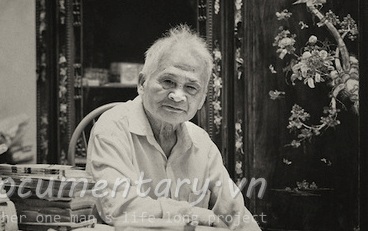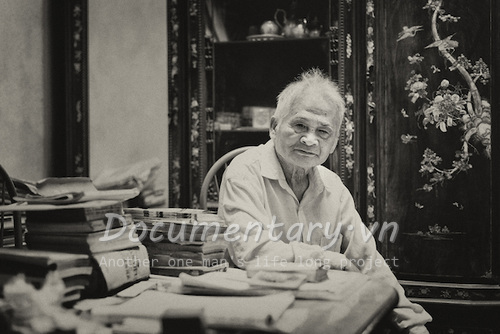
In 1956, he graduated with a bachelor's degree in Chinese Literature at the Nanning Campus, China. In 1962, he became a member of the Communist Party of Vietnam. He began teaching Chinese Literature at the Faculty of Literature, Hanoi University of Science in 1965. He was passionate about teaching, researching, and studying to improve his qualifications. In 1979, he successfully defended his doctoral thesis in Literature with the topicOrigin and structure of Nom scriptat Hanoi University of Science. In 1984, he was awarded the title of Associate Professor by the State. Since 1983, he has taken on additional teaching duties at the University of Science and the Institute of Han Nom. He has successfully guided many graduate and master students majoring in Han Nom and Literature. In 2000, he was awarded the title of Professor.
Mr. Le Van Quan is an example of effort in studying, researching and teaching not only in his professional field but also in learning foreign languages. He is fluent in Chinese and used to teach Chinese at Hanoi University of Foreign Languages. In 1982, he participated in a specialized course in Russian at Hanoi University of Foreign Languages. During his 10 months as an expert in the French Republic, he improved his French and collaborated in translating works.Newly compiled legendary stories with additional commentary and interpretationinto French.

Professor, Doctor, Meritorious Teacher Le Van Quan - Head of the Department of History of Oriental Philosophy and Vietnamese Philosophical Thought (1993-2002). He is one of the leading scientists in Han Nom and Oriental Philosophy.
Photo: Jackie Chan
In 1989, Hanoi University of Science assigned him and some staff of the Faculty of Philosophy to establish and develop the major of History of Oriental Philosophy at the Faculty of Philosophy. He worked at the Faculty of Philosophy from then until his retirement (in 2002). In 1993, the Department of History of Oriental Philosophy and Vietnamese Thought was established, and he was the Head of the Department. During his time working, he devoted all his heart and mind to teaching, writing textbooks, monographs, and reference books on philosophy, Oriental and Vietnamese culture. Professor Le Van Quan has successfully guided many PhD students and graduate students in Philosophy.
He affirmed that there is Vietnamese philosophy, but to find and clarify Vietnamese philosophy, it is necessary to exploit Eastern philosophical thought, political thought, ethical thought, education, aesthetics... He was the first person to guide students and postgraduates in philosophy to do research on Chinese philosophy and Vietnamese thought (including me). He taught History of Chinese philosophy, Introduction to Zhouyi, Zhouyi and Management Science to students and postgraduates in Philosophy and Social Management. Scientific works of great value such as:Essay on the I Ching Thought,I Ching – Cosmology,Outline of the History of Chinese Thought,I Ching and Management Science,Vietnamese prophets,Yin and Yang and the Five Elements in Human Life,Sources of traditional Vietnamese culture, History political ideology-Vietnamese societymthrough the periods from prehistoric to feudal... The works and books he wrote are the foundation for research on Eastern philosophical thought and Vietnamese political and social thought. That is also the guideline for the direction of building and developing the subject of History of Eastern philosophy and Vietnamese philosophical thought of the Faculty of Philosophy.
When I was a third-year student of the Faculty of Philosophy, Hanoi University of Science, we were very excited to see the History of Ancient Chinese Philosophy course in the timetable. At that time, in the late 80s of the 20th century, books and magazines were very limited, Mr. Quan's lectures seemed to enlighten us about China, about Chinese civilization, about the profound mysteries of Chinese philosophy... I liked it and had the idea that I would learn and research Eastern philosophy from then on. I wanted to meet him to ask for his guidance, but because I heard that Mr. Quan was difficult, I was afraid. But my determination to learn knowledge helped me boldly meet him to ask for his guidance. He was very enthusiastic in supporting and encouraging students to research Eastern philosophy, but he put forth a condition: "You must learn ancient Chinese characters before I will accept your guidance." Alas, a very difficult condition and seemingly contrary to the trend at that time, when people were stopping learning Russian to switch to English. But I think that is a motivation to explore a new language. He, together with Mr. Hoang Van Lau (Han Nom Research Institute), organized a class of ancient Chinese for students and staff who wanted to learn. Just like that, each Chinese character the teachers passed on to us was like a brick building the foundation of knowledge about culture, civilization, and philosophy of not only China but also the East Asian region influenced by Chinese civilization. The little student followed the teacher through all levels of education, focusing on researching issues of Chinese, Vietnamese, and Japanese philosophical thought.
In 1993, I graduated from university, planning to work in a different field with a salary in foreign currency - the dream of students at that time. My teacher came to my house, talked to my parents to encourage me to stay at school and work as a lecturer at the Department of History of Oriental Philosophy and Vietnamese Thought. My parents were very excited and proud because being a lecturer at the University was a great honor. My career started like that. Today, when writing these lines, I sincerely thank my teacher and parents for advising me on my career choice, thanks to which I was able to continue my dreams of exploring the horizons of knowledge, passing on my passion to future generations of students.
During the process of studying and working, I understood him more and more. He was not as difficult as everyone said, but he was a straightforward, honest, but hot-tempered person and of course he had a personality. When we sat down to talk, he rarely talked about himself but often talked about human affairs, about what he was doing and his plans for the future. He often said: "I will prepare (write) for the department a set of textbooks and reference materials on the History of Chinese Philosophy, on the History of Vietnamese Political and Social Thought. If I can do that, I will fulfill my responsibility to the faculty, the department and you." Although he retired in the 2000s, he did not stop working. The image of him diligently sitting at his desk was an image I often saw every time I visited him. This year, he realized that his health was no longer good, so he chose books to give me and my colleagues in the Philosophy Department to continue our research. I was touched and also worried because the things he imparted were too great for a small intellect like mine.... Our generation will always have to strive to practice and learn from the teachers to continue the development of the field of Eastern Philosophy research and Vietnamese philosophical thought in the new era.
|
PROFESSOR, DOCTOR, MERITORIAL TEACHER LE VAN QUAN
+ Work unit: Faculty of Literature (1965-1989). Faculty of Philosophy (1989-2002). + Management position: Head of the Department of History of Oriental Philosophy and Vietnamese Philosophical Thought (1993-2002).
Chinese Textbook. University and Vocational High School Publishing House, 1978. Research on Nom scriptSocial Sciences Publishing House, 1981. Vietnamese - Japanese Conversation. Shulin University, Tokyo, Japan, 1985. Self-study Nom scriptSocial Sciences Publishing House, 1989. Ancient Chinese Textbook, episode 1. University and Vocational High School Publishing House, 1991. Ancient Chinese Textbook, episode 2. University and Vocational High School Publishing House, 1992. Modern Chinese-Vietnamese Dictionary. University and Vocational High School Publishing House, 1992. Anthology of Vietnamese LiteratureSocial Sciences Publishing House, 1993. Modern Chinese-Vietnamese Dictionary(editor-in-chief) Education Publishing House, 1993. Essay on the I Ching Thought. Education Publishing House, 1993. I Ching – Cosmology. Education Publishing House, 1995. Outline of the History of Chinese Thought. Education Publishing House, 1997. I Ching and Management Science. Education Publishing House, 1997. Book of Changes. Education Publishing House, 1997. Vietnamese prophetsNational Culture Publishing House, 2000. Yin and Yang and the Five Elements in Human Life,National Culture Publishing House, 2002. The quintessence of Eastern culture– The Book of Changes on life and behavior, Hanoi Publishing House 2003 History of political thought- Vietnamese society from prehistory to the nation-building period, National Political Publishing House, Hanoi – 2006 Sources of traditional Vietnamese culture, Labor Publishing House, Hanoi– 2007 History of political thought- Vietnamese society from Chinese domination to the Ly - Tran period, National Political Publishing House, Hanoi – 2008 The I Ching and Traditional Oriental Culture, Culture Publishing House– Information, Hanoi 2010 History of political thought- Vietnamese society during the Le - Nguyen period, National Political Publishing House, Hanoi – 2013 Tale of Kieu - the quintessence of Vietnamese culture, Hong Duc Publishing House – 2015 |
Author:Dr. Tran Thi Hanh
Newer news
Older news